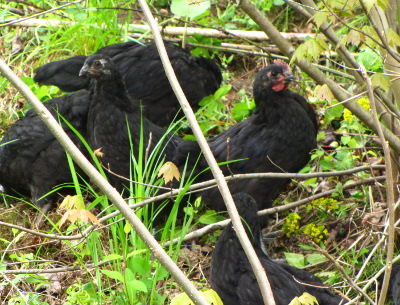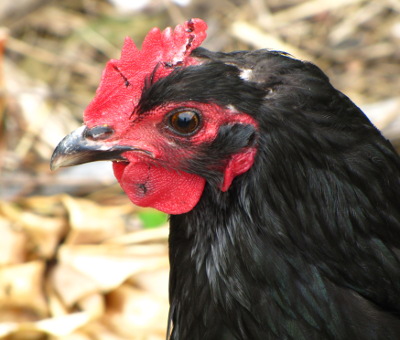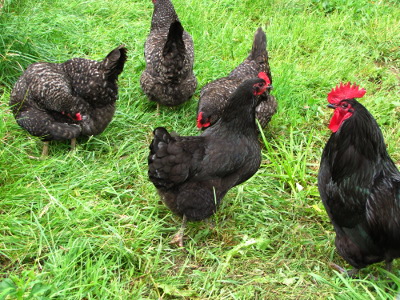
How to keep chickens from flying over fences
 When dealing with the natural
world, it's often better to deter than to prevent. Our
experiments with keeping deer
and pets
out of the garden
are one example, but so are our methods of
constraining chickens to their pastures. Unfortunately, when
you're only deterring behavior you don't want, sometimes animals slip
through the cracks. At that point you have to decide between the
Fort Knox approach and the kid glove approach.
When dealing with the natural
world, it's often better to deter than to prevent. Our
experiments with keeping deer
and pets
out of the garden
are one example, but so are our methods of
constraining chickens to their pastures. Unfortunately, when
you're only deterring behavior you don't want, sometimes animals slip
through the cracks. At that point you have to decide between the
Fort Knox approach and the kid glove approach.
I've been thinking of
these two types of animal deterrence because we
had dozens of chicken escapes last week. First, I moved the six
week old chicks
out of the forest garden and into a pasture full of lush grasses
and clovers. They hated the change. When the first few
chicks started flying over our temporary
fencing, I beefed up
sagging spots, but I soon realized that it was
just plain silly (and nerve-wracking) to keep chickens on grass if they
want a more forested environment. So we transferred them to their
grown up coop with its forest pasture,
and suddenly everything was serene again.
 The
problem with our adult chickens is going to take a bit more
fixing. Two weeks ago, I noticed that one of our Australorp hens
was perching in the coop all day long, and after spending an afternoon
weeding the garden and keeping an eye on the flock, I figured out why
--- our rooster was molesting her. Yes, chicken sex never looks
elegant to the human eye, but this was clearly different. Our
usually kind-hearted rooster was chasing this hen down, mounting her,
chasing her, mounting her, pecking viciously at her head, and only
stopping when she lay nearly dead on the ground. We removed the
pecked-at chicken from the flock and put her in an isolation
coop, but after she
bounced back and started laying again, we
returned her to the main flock. Not only did the rooster start
picking on her again, he also took a dislike to a second Australorp
hen, and the two downtrodden biddies started flying over the fence and
into other pastures to escape.
The
problem with our adult chickens is going to take a bit more
fixing. Two weeks ago, I noticed that one of our Australorp hens
was perching in the coop all day long, and after spending an afternoon
weeding the garden and keeping an eye on the flock, I figured out why
--- our rooster was molesting her. Yes, chicken sex never looks
elegant to the human eye, but this was clearly different. Our
usually kind-hearted rooster was chasing this hen down, mounting her,
chasing her, mounting her, pecking viciously at her head, and only
stopping when she lay nearly dead on the ground. We removed the
pecked-at chicken from the flock and put her in an isolation
coop, but after she
bounced back and started laying again, we
returned her to the main flock. Not only did the rooster start
picking on her again, he also took a dislike to a second Australorp
hen, and the two downtrodden biddies started flying over the fence and
into other pastures to escape.
 The
Fort Knox approach would be to clip the hens' wings or add another
strand of fencing, but as you can tell from the chick example, I prefer
listening to what the animals are telling me, then trying to fix their
problem, not just my
own. Their problem is clearly Mr. Rooster, who may have outlived
his welcome on our farm. He was a perfect gentleman all winter,
guarding the girls as they free-ranged
in the woods, but
something about the confined environment of the
pastures (fewer trees? less room for the girls to run away?) flicked a
switch and turned him from an asset into a liability.
The
Fort Knox approach would be to clip the hens' wings or add another
strand of fencing, but as you can tell from the chick example, I prefer
listening to what the animals are telling me, then trying to fix their
problem, not just my
own. Their problem is clearly Mr. Rooster, who may have outlived
his welcome on our farm. He was a perfect gentleman all winter,
guarding the girls as they free-ranged
in the woods, but
something about the confined environment of the
pastures (fewer trees? less room for the girls to run away?) flicked a
switch and turned him from an asset into a liability.
The obvious solution is
to eat the rooster and simply save back one of
the current batch of broilers to replace him. The new cockerel
will be just old enough in August that he should  be able to fertilize
the fall round of hatching eggs, and then he can guard the girls all
winter long. Yes, he'll be related to whichever of our current
hens is his mother (and to his sisters if we save a few to expand our
laying flock), but I'm willing to deal with a bit of inbreeding to give
our downtrodden hens a couple of months off from rooster molestation.
be able to fertilize
the fall round of hatching eggs, and then he can guard the girls all
winter long. Yes, he'll be related to whichever of our current
hens is his mother (and to his sisters if we save a few to expand our
laying flock), but I'm willing to deal with a bit of inbreeding to give
our downtrodden hens a couple of months off from rooster molestation.
This is all assuming
that the eggs currently in our incubator will
hatch well despite the power outages they experienced. I'm
keeping my fingers crossed and dreaming of rooster stew.
Want more in-depth information? Browse through our books.
Or explore more posts by date or by subject.
About us: Anna Hess and Mark Hamilton spent over a decade living self-sufficiently in the mountains of Virginia before moving north to start over from scratch in the foothills of Ohio. They've experimented with permaculture, no-till gardening, trailersteading, home-based microbusinesses and much more, writing about their adventures in both blogs and books.
Want to be notified when new comments are posted on this page? Click on the RSS button after you add a comment to subscribe to the comment feed, or simply check the box beside "email replies to me" while writing your comment.

Interesting distinction; in computer security, I've sometimes characterized it as more like "detect" vs "prevent". Do you make it impossible for your users to run warez sites out of their home directories, or just make it easy to detect it when they do? (And then presumably notify them and demand that they cut it out. :^) A lot of security focuses on prevention, but detection is often a lot more cost-effective. (And can even be more effective: If you prevent six bad things, and someone comes up with a seventh, and you don't have any detection, then you may never know... Whereas if your focus is on spotting anomalous things, you don't necessarily have to know in advance as much what you're looking for, you can just look for "anything weird" and go from there.)
I wouldn't have necessarily guessed that this concept applied to homesteading. :^)
Olan --- I've noticed the lack of eggs from the picked on hens too. I guess you're just too stressed to lay when you're getting beat up!
Josh --- Fascinating how the worlds of farm and computer security work alike! Thanks for giving me such interesting thoughts to ponder this morning!
Thanks for giving me such interesting thoughts to ponder this morning!